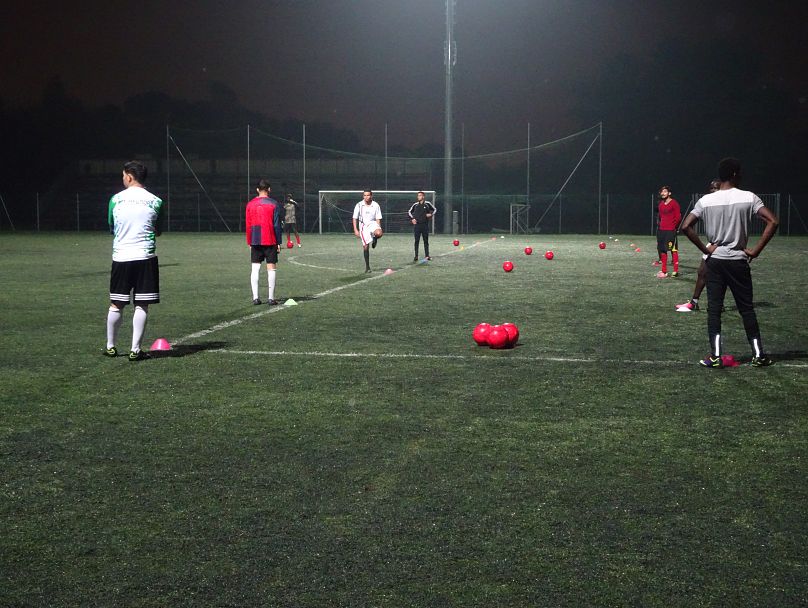The Sant’Ambroeus football club is the first migrant team in Italy to play in the Italian Football Federation (FIGC). It hopes to promote the motto: “Love football. Hate racism”.
It’s a rainy Thursday afternoon at Porto di Mare, in the southeast periphery of Milan. On the pitch of the Associazione Calcio Corvetto, the players are starting to gather for their training.
They belong to the Sant’Ambroeus Football Club — the first migrant team in Italy to play in the Italian Football Federation (FIGC).
It’s dark and wet on the pitch, but everyone is excited and full of energy.
Sant’Ambroeus FC was founded last May. The name is a tribute to the patron saint of Milan, Sant’Ambrogio, “because we are all Milanese, despite our origins”, the club’s manager, Davide Salvadori, tells Euronews.
“St. Ambroeus FC wants to establish itself as a reference point for sports in Milan, a symbol of integration and anti-racism... through a healthy activity like football, a vehicle for knowledge, exchange and sociability, an excellent way to overcome all racism and a means of understanding and assimilating respect for the rules”, the moto on the club's website says.
The team is made up of 60 players, comprised mostly of asylum seekers and refugees.
The majority of the players come from the West African countries of Senegal, Gambia and Mali, but the team is represented by players of 14 nationalities, and range in age from 17 to 26.
Mamadou, a 25-year-old from Senegal, is the captain of the team.
The midfielder is one of the most experienced footballers on the club and he used to play in Senegal’s second league.
“I did not really want to be the captain, but then they chose me”, Mamadou tells Euronews, “it’s a big honour, but also a lot of responsibility”.
Mamadou arrived in Italy by boat four and a half years ago.
He emotionally shared how he was jailed in Libya for four months, confronted by guns and violence every day. His journey from North Africa took him eight months, when a humanitarian boat came to rescue his group in the middle of the Mediterranean
After making his way north to Milan, Mamadou was granted the refugee status and has been working for a little more than a year now; first in a carpentry and then as a security guard for a bank, and lives in an apartment with a friend.
“It was hard in the beginning with the documents and all”, he says, “You find good and bad people along the way, but now I am good here”.
Assimilating to a new culture can be difficult for anyone.
But in Milan, football represents an opportunity to make new friends who all share a passion for the sport.
“The Italians are like little girls, always afraid to get hurt”, says 17-year-old Youssef from Morocco, the youngest member of the team.
“I like this team because you really live the game."
Youssef was actually born in Italy, but spent his entire childhood in Morocco, returning to Italy eight months ago with this father. His perfect Italian allows him to attend school while dreaming of becoming a professional footballer.
Abdul, from Gambia, shares his teammates dream of becoming a professional football player.
Abdul is 18 years old and arrived in Italy two years ago. Like his captain Mamadou, Andul fled Africa by boat with only one friend as company.
Abdul says that when he reached Sicily he was placed in a migrant centre alongside 500 more refugees, and described the conditions there as “horrible”.
He now lives with an Italian family in one of the most central areas of Milan, where he goes to school and works in a photocopy shop five days a week.
Despite the many difficulties its members have faced, the team has a relaxed and friendly vibe. Many players feel the club brings them the closest they can be to a normal life in Italy
But the reality is that many of them do not have regular documents. The majority, in fact, are still waiting to see whether their asylum requests will be accepted.
And amid rising nationalism in Italy, the future for some of the players looks uncertain.
The ‘Decreto Sicurezza’, a new security policy recently approved by the Italian parliament, aims to make it harder for immigrants to arrive and stay in Italy.
Several of the Sant’Ambroeus international players could be affected by this.
“For the moment, none of our players risks to be repatriated, but many are under humanitarian protection, which is going to be abolished with the new decree. Unless they manage to convert their status in a working residence permit in due time, the new directive won’t allow them to do it in the future” says manager Salvadori.
“Our team risks being largely compromised in the next months.”
For the time being, the club members have no choice but to continue with their regular activities.
After raising more than €10,000 by crowdfunding in June, the athletes now regularly have self-financing dinners in collaboration with a local bar.
However, being part of the FIGC is a costly business. From registration to membership, medical checkups, equipment, pitches and travel expenses, costs for the footballers add up.
Their next steps will be to better structure the entire project and to continue training hard in order to go deep into the playoffs.
Regardless of their results on the pitch, Sant’Ambroeus FC is living by one, powerful motto. “Love football. Hate racism.”












